- Home
- Newt Gingrich
A Nation Like No Other
A Nation Like No Other Read online
Table of Contents
Title Page
Dedication
Introduction
PART I - REMEMBERING WHO WE ARE
CHAPTER ONE - THE AMERICAN CREED
AN APPLE OF GOLD AND A PICTURE OF SILVER
A HIGHER INSPIRATION
A NATION FORGED IN EQUALITY
AMERICAN CITIZENS OF BRITISH LIBERTY
A NATION WITH THE SOUL OF A CHURCH
NATURAL LAW AND THE NATURAL RIGHTS OF MAN
ENGLAND’S FIRST VENTURES IN AMERICA
UNITY UNDER GOD
CHAPTER TWO - HABITS OF LIBERTY THE SHIELD OF THE AMERICAN REVOLUTION
THE REPUBLIC WE WERE GIVEN
FIVE AMERICAN HABITS OF LIBERTY
EXEMPLARS OF LIBERTY
CHAPTER THREE - WHO WE ARE IN THE WORDS OF NEW AMERICANS AND THOSE WHO LOVE AMERICA
ALEXIS DE TOCQUEVILLE - FRENCH POLITICAL PHILOSOPHER, DEMOCRACY IN AMERICA, ...
NICOLAS SARKOZY - PRESIDENT OF FRANCE, ADDRESS BEFORE A JOINT SESSION OF THE ...
ALP GURPINAR - TURKISH IMMIGRANT, REAL AMERICAN STORIES
JULIA GILLARD - PRIME MINISTER OF AUSTRALIA, ADDRESS BEFORE A JOINT SESSION OF ...
IGOR FINKLER - RUSSIAN IMMIGRANT, ON CBS REALITY SHOW UNDERCOVER BOSS, ...
FAROOZ - IRANIAN IMMIGRANT, “CITIZENSHIP: THE PURSUIT OF HAPPINESS,” ...
SUDANESE IMMIGRANT - “CITIZENSHIP: THE PURSUIT OF HAPPINESS,” REASON.TV, JUNE ...
TONY BLAIR - FORMER PRIME MINISTER OF THE UNITED KINGDOM, TIME MAGAZINE, ...
UTKARSH SATA - INDIAN IMMIGRANT CURRENTLY APPLYING FOR CITIZENSHIP, REAL ...
POPE BENEDICT XVI - APOSTOLIC JOURNEY TO THE U.S., WELCOMING CEREMONY AT THE ...
JEFFREY KOFMAN - CANADIAN IMMIGRANT AND ABC NEWS CORRESPONDENT, FROM HIS ...
CHRISTOPHER HITCHENS - BRITISH IMMIGRANT, AUTHOR, AND COLUMNIST, INTERVIEW ...
ANTONY KIM - KOREAN IMMIGRANT AND PROFESSIONAL GOLFER
ANONYMOUS VIETNAMESE IMMIGRANTS; - HASSAN ASMAN ALI, IRAQI IMMIGRANT; JASMINE ...
GIULIANA RANCIC - ITALIAN IMMIGRANT, HOST ON THE E! TV NETWORK AND STAR OF ...
TEUTA DEDVUKAJ - ALBANIAN IMMIGRANT, REAL AMERICAN STORIES
MAE JOO - KOREAN IMMIGRANT, FOX NEWS PRODUCER AND FORMER AIDE TO THE BUSH ...
GEORGE PATDAVIL - INDIAN IMMIGRANT, REAL AMERICAN STORIES
OLEG HASKEL - RUSSIAN IMMIGRANT, REAL AMERICAN STORIES
TOVA FRIEDMAN - HOLOCAUST SURVIVOR, REAL AMERICAN STORIES
DERRECK KAYONGO - UGANDAN REFUGEE, “GLOBAL SOAP PROJECT,” REAL AMERICAN STORIES
PART II - DEFINING AMERICAN EXCEPTIONALISM
CHAPTER FOUR - FAITH AND FAMILY WHY BOTH ARE UNDER ATTACK
ONE OUT OF MANY:THE REVOLUTIONARY AMERICAN MODEL OF RELIGIOUS PLURALISM
AMERICA AWAKENS
SLAVERY AND THE CIVIL WAR
THE EUGENICS MOVEMENT AND THE REPUDIATION OF LIBERTY
THE CIVIL RIGHTS MOVEMENT
REAGAN SHINES A LIGHT
THE WAR ON FAITH
FAMILY:THE INCUBATOR OF LIBERTY
CHILDREN AND THE FUTURE OF FREEDOM
CHAPTER FIVE - WORK IN AMERICA, IT’S CALLED “OPPORTUNITY”
THE LORD’S WORK
AN AMERICAN MERITOCRACY
PRIVATE PROPERTY: THE LINCHPIN OF A FREE ECONOMY
THANK HAMILTON
A SAFE HARBOR FOR INNOVATION
A LOST WAR
HOW TO LIBERATE WORK
THE BETRAYAL OF THE PRIVATE SECTOR
CHAPTER SIX - CIVIL SOCIETY THE UNITED CITIZENS OF AMERICA
CIVIL SOCIETY IN ACTION
CIVIL SOCIETY:AN AMERICAN INNOVATION
PHILANTHROPY: FREEDOM’S WAY OF SPREADING THE WEALTH AROUND
CIVIL RIGHTS AND CIVIL SOCIETY
OPENING DOORS TO NEW AMERICANS
WELFARE REFORM: ANOTHER SUCCESS FOR CIVIL SOCIETY
THREATS TO CIVIL SOCIETY
THE RISING COSTS OF THE WELFARE STATE
REASSERTING AND REBUILDING CIVIL SOCIETY
CHAPTER SEVEN - THE RULE OF LAW ONE NATION, UNDER GOD, EQUALLY PROTECTED
THE RULE OF LAW AND THE FOUNDING GENERATION
THE RULE OF LAW AND PROPERTY RIGHTS
CONTEMPORARY THREATS TO THE RULE OF LAW
CHAPTER EIGHT - SAFETY AND PEACE AMERICA, THE INDISPENSIBLE NATION
PEACE THROUGH STRENGTH
REAGAN AND CARTER: LESSONS IN STRENGTH AND WEAKNESS
RADICAL ISLAMISTS: OUR UNNAMED ENEMIES
NO STRENGTH AND NO STRATEGY
PART III - AMERICA RISING
CHAPTER NINE - RESTORING AMERICAN EXCEPTIONALISM
THE ECONOMIC COLLAPSE OF THE BIG-GOVERNMENT WELFARE STATE
THE MORAL COLLAPSE OF THE BIG-GOVERNMENT WELFARE STATE
WHY AMERICAN EXCEPTIONALISM MATTERS
TEN STEPS TO RESTORING AMERICAN EXCEPTIONALISM
RESTORING AMERICAN EXCEPTIONALISM AND AMERICAN PROSPERITY BY RESTORING THE WORK ETHIC
REAL CHANGE CAN HAPPEN FAST
CHAPTER TEN - THE BOWLING GREENS IN OUR BACKYARDS
DEFENDING FAITH AND FAMILY
DEFENDING CIVIL SOCIETY
WORK AND INNOVATION
SAFETY AND PEACE
CONCLUSION
Acknowledgments
NOTES
INDEX
Copyright Page
To the first-generation Americans,
who remind us again and again that
America remains the last best hope of mankind.
INTRODUCTION
ON BOWLING GREEN
Lower Manhattan was in turmoil on the blazing hot afternoon of July 9, 1776. To our modern eyes, the city would seem little more than a village of thirty thousand souls, a far cry from the familiar New York of soaring skyscrapers, the Brooklyn Bridge, and the Statue of Liberty. Instead we would find two- or three-story homes, rickety wooden warehouses lining the waterfront on the East River, and little alleyways shooting off narrow cobblestone streets, the only wide street being the “broad way” that cut through the middle of the island.
The tallest building was Trinity Church (later to be shadowed, for a while, by two far taller structures, and to serve on one September morning as a makeshift hospital and morgue at the outset of another generation’s great struggle). On this summer day, just up the street from that church, the defining conflict of the first generation of Americans was unfolding. A revolution was being born, and already some thought it might be dying.
After a long day of digging fortifications, drilling, and gazing with apprehension toward Staten Island, by order of Commander George Washington, a sweaty, bedraggled garrison of colonial troops halted work, picked up their muskets, formed ranks, and paraded to the City Commons, near what is now City Hall.
As they formed up, rank after rank, muskets shouldered, the soldiers understood their lives were imperiled—for just a few miles away sat an armada of more than 140 ships, theretofore the greatest transoceanic invasion force in history. It had come to force them to submit to an imperial will—and if they refused, to kill them.
The rebellion, which had started a year earlier with “the shot heard round the world” on Lexington Green, was reaching the point of no return. After winning crucial early victories, the colonists were now facing the bayonet-studded reply of the man who claimed to be their king. A 30,000-man army comprising the finest professionally trained troops in the world—an army with a century-long, nearly unbroken string of victories—was off-loading on Staten Island. The British forces included regiments both honored and feared: the Black Watch, the Coldstream Guards, and the mercenary Hessian heavy infantry and riflemen. They stepped on shore openly and defiantly, believing they had nothing to fear from th
is rabble-in-arms frantically digging in on the other side of the harbor.
Out on the bay, light sloops proudly flying the British Empire’s royal ensign were dashing back and forth. Blockading the entrance to what had once been a thriving port, now cut off from the rest of the world, 44-gun frigates and three-decker, 70-gun ships of the line sat without fear of the assembled throng, which had no navy other than small privateers and converted merchant ships fitted with a few pieces of artillery. If provoked that day, the Brits could easily have advanced up the Hudson River with the morning tide, leveled most of the city, and annihilated the rebels. They held this “mob” in such contempt, however, that they did not even bother to venture a few gunboats up the river to disperse it. There would be plenty of time for the “fox hunt,” as they called it, to finish off these “colonial bumpkins” and return home by Christmas. In fact, many British sailors expected the rebels to drop their weapons and melt away without firing a shot once the full might of Empire and King had offloaded and stood ready for battle.
Meanwhile the colonial troops, a few thousand strong, stood silent as they formed their ranks. They were men and even women who had come to Manhattan from towns throughout the colonies, fighters from as far north as New Hampshire and as far south as the Carolinas. Most were farmers, shopkeepers, fishermen, or laborers, and several hundred were hard-bitten riflemen from the distant frontier, having trekked for weeks to join this fray. Few had tasted the sting of battle other than some veterans of the fighting up around Boston the year before, or those who had faced the French and their Indian allies out on the frontier nearly twenty years prior. Most lacked uniforms, and many were barefoot after wearing out their shoes on the way to New York.
Looking out at the men, an officer stepped forward onto a hastily built dais and raised a thick sheet of paper. His audience stirred, anticipating what it was—an explanation of why they were here, why the invasion fleet was off-loading just a few miles away, and why they would be called upon to court death in the months to come.
“By orders of his Excellency, General George Washington commanding, I am to read the following!” the officer cried, his voice carrying across the park and echoing up the street of Broad Way. The chattering civilians who had gathered, most in support of the troops, some showing disdain, fell silent. The officer proclaimed, “Authored by the Continental Congress in Philadelphia this first week of July.” He paused as the intense heat pushed beads of sweat down his face, and then continued: The Declaration of Independence
When, in the course of human events, it becomes necessary for one people to dissolve the political bands which have connected them with another, and to assume among the powers of the earth, the separate and equal station to which the laws of nature and of nature’s God entitle them, a decent respect to the opinions of mankind requires that they should declare the causes which impel them to the separation.
We hold these truths to be self-evident, that all men are created equal, that they are endowed by their Creator with certain unalienable rights, that among these are life, liberty and the pursuit of happiness.
That to secure these rights, governments are instituted among men, deriving their just powers from the consent of the governed.
Excited murmurs shot through the crowd. The officer continued reading:That whenever any form of government becomes destructive to these ends, it is the right of the people to alter or to abolish it, and to institute new government, laying its foundation on such principles and organizing its powers in such form, as to them shall seem most likely to effect their safety and happiness.
Emotions rose among the listeners, but most remained silent. A nearby row of frigates, with their gun ports open so the faint, late afternoon breeze could air out their ships, was a sobering sight. For some, in the upcoming weeks the flash of fire from those guns would be the last thing they ever saw.
Step by step, grievance by grievance, the declaration outlined the American case against their British king. The listeners nodded their heads at some arguments, while other pronouncements drew excited exclamations of agreement or impassioned denunciations of King George. Finally the officer’s voice shifted into a more decisive tone:And for the support of this Declaration, with a firm reliance on the protection of Divine Providence, we mutually pledge to each other our Lives, our Fortunes, and our Sacred Honor.
The words washed over the anxious throng of cobblers, shopkeepers, tin-smiths, and farmers. When the aide finished, the regiment cheered before the officer ordered, “Battalions, dismissed!” The surrounding crowd roared in approval. The more educated among them were eager to get a copy of the Declaration, which printers were already selling for a penny a sheet. Amidst cheers and back-slapping, men held their muskets high and gave three huzzahs for General Washington and three more for the Continental Congress.
Inspired by this declaration of independence, a crowd stormed down Broad Way to the small park at Bowling Green. There, they used grappling hooks and crowbars to tear down a statue of the horse-mounted British king. They dismembered the leaden corpse with hammers and chisels, carting away the metal to use as bullets—ironically, the king’s statue would now provide ammunition for the rebels to employ against his troops. The spectacle outraged the Brits, who witnessed the statue’s destruction from their ships. As one of the first acts of rebellion inspired by the Declaration of Independence, the scene at Bowling Green became a symbol of the Revolution, a sign that the Declaration was not just a philosophical treatise, but a call to action.
The colonists’ euphoria, however, was tempered by a sense of apprehension, especially among war veterans. This would be a hard fight that could last for years, and victory was far from certain. In fact, that night a few colonial soldiers would quietly lay down their muskets and slip away, joining the masses of civilians evacuating what was expected to soon become a bloody field of battle.
But the Declaration had struck a chord. The following dawn, the vast majority of soldiers defiantly returned for morning roll call, despite the overwhelming forces arrayed against them. They would persevere a month later through the debacle on Long Island, and after suffering months of defeats, they would brave the frozen retreat across New Jersey. On Christmas Eve, they would faithfully follow their leader back across the Delaware River to a remarkable victory at Trenton. They would withstand Valley Forge, summers of heat and disease, winters of cold and starvation, for eight blood-soaked years. They endured because they believed in a set of ideals enshrined in a document written by their fellow citizens, a declaration proclaiming that rights such as life, liberty, and the pursuit of happiness are unalienable, that we are endowed with those rights by our Creator, and that all men are created equal, as we are all made in His image.
That was worth fighting for, suffering for, and dying for. That is what made Americans unique in human history and made America, from its inception, a nation like no other.
For over four hundred years, America has cultivated a singular set of vigorous virtues and habits of liberty. We’re the people whose first sovereign act was to fire our king. We did so in a classically American way, with clarity and courage.
We declared to the world who we are, explained which government actions were intolerable, and presented a clear case why King George III was a tyrant unfit to lead a free people. In proclaiming our rights as free men, we openly defied one of the greatest powers in the world. We knew this would mean invasion and war, which is why the Declaration ends with its signatories pledging to one another their lives, fortunes, and sacred honor.
The colonists fought willingly and courageously to realize the Declaration’s ideals. Most were not professional soldiers but volunteers—free citizens who were willing to sacrifice everything to secure a land of freedom for their families, their children, and their grandchildren yet to be born.
The ideals expressed in the Declaration of Independence, and the unique American identity that arose from an American civilization that honored them, form what we call today
“American Exceptionalism.” This guiding ethos has always set America apart from all other nations. From its inception, our governing philosophy has been an exception to the practices of governments everywhere else in the world, as detailed by Alexis de Tocqueville and many others. Embracing freedom at a time when Europe and the rest of the world were mired in monarchies and despotism, we settled the frontier, became the world’s foremost advocate of economic freedom, led the world in science and technology, vanquished fascism, won a half-century battle against worldwide Communism, and eventually emerged as the world’s sole superpower.
Americans today still overwhelmingly believe in American Exceptionalism. A December 2010 Gallup poll asked, “Because of the United States’ history and its Constitution, do you think the U.S. has a unique character that makes it the greatest country in the world, or don’t you think so?” Eighty percent of Americans responded “yes,” including 91 percent of Republicans, 77 percent of independents, and 73 percent of Democrats. Only 18 percent answered “no.”
However, even while expressing support for the concept of American Exceptionalism, many Americans have forgotten the original ideals represented by that concept, ideals that have animated the ethos of American life throughout our history and have led to America’s unprecedented prosperity and global preeminence. Moreover, there is a determined group of radicals in the United States who outright oppose American Exceptionalism. Often convinced America is a uniquely brutal, racist, and malevolent country, these malcontents struggle to reduce American power and transform our political and economic systems into the kind of statist, socialist model that is now failing across Europe.
You don’t need to look hard today to find this radical view, especially in the mainstream media and among left-wing pundits. Washington Post columnist Matt Miller mocks American Exceptionalism as a symptom of declining national self-confidence, writing, “Does anyone else think there’s something a little insecure about a country that requires its politicians to constantly declare how exceptional it is? A populace in need of this much reassurance may be the surest sign of looming national decline.”1 Similarly, in a Politico column titled “U.S. Is Not Greatest Country Ever,” former L.A. Times editorial page editor Michael Kinsley argues that American Exceptionalism is a form of self-defeating arrogance: “The notion that America and Americans are special, among all the peoples of the earth, is sometimes called ‘American exceptionalism.’... This conceit that we’re the greatest country ever may be self-immolating. If people believe it’s true, they won’t do what’s necessary to make it true.”2

 1945
1945 Collusion
Collusion Trump's America
Trump's America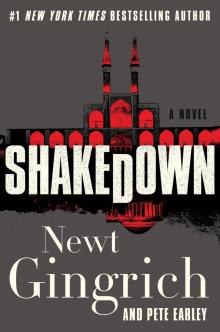 Shakedown
Shakedown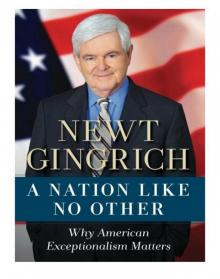 A Nation Like No Other
A Nation Like No Other To Try Men's Souls - George Washington 1
To Try Men's Souls - George Washington 1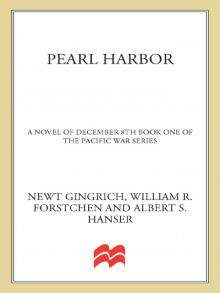 Pearl Harbor: A Novel of December 8th
Pearl Harbor: A Novel of December 8th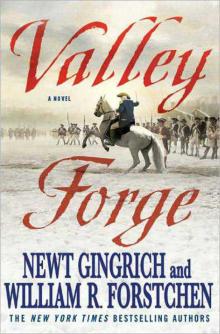 Valley Forge: George Washington and the Crucible of Victory
Valley Forge: George Washington and the Crucible of Victory To Save America
To Save America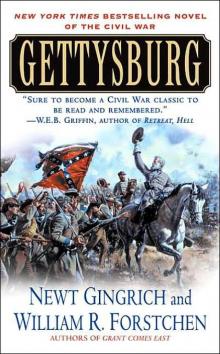 Grant Comes East cw-2
Grant Comes East cw-2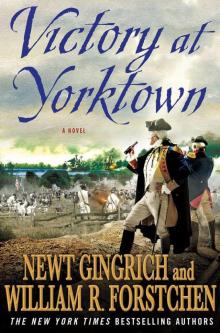 Victory at Yorktown: A Novel
Victory at Yorktown: A Novel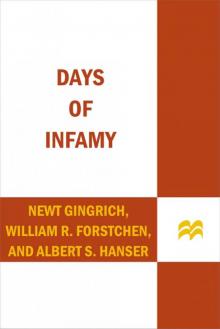 Days of Infamy
Days of Infamy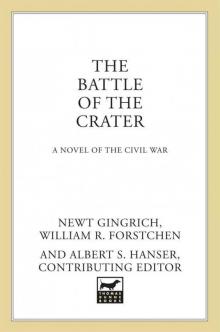 The Battle of the Crater: A Novel (George Washington Series)
The Battle of the Crater: A Novel (George Washington Series)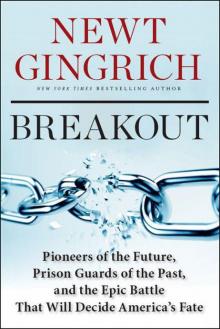 Breakout: Pioneers of the Future, Prison Guards of the Past, and the Epic Battle That Will Decide America's Fate
Breakout: Pioneers of the Future, Prison Guards of the Past, and the Epic Battle That Will Decide America's Fate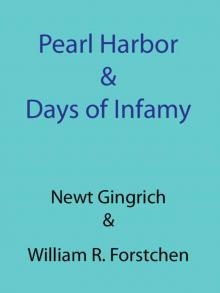 Pearl Harbour and Days of Infamy
Pearl Harbour and Days of Infamy Pearl Harbour - A novel of December 8th
Pearl Harbour - A novel of December 8th Understanding Trump
Understanding Trump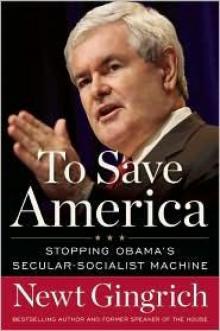 To Save America: Abolishing Obama's Socialist State and Restoring Our Unique American Way
To Save America: Abolishing Obama's Socialist State and Restoring Our Unique American Way